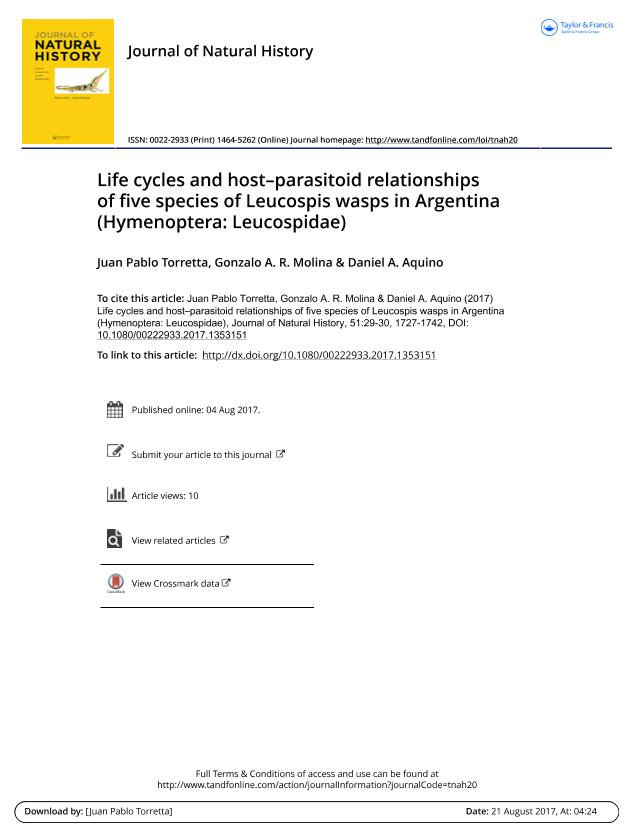Mostrar el registro sencillo del ítem
dc.contributor.author
Torretta, Juan Pablo

dc.contributor.author
Molina, Gonzalo Alberto Roman

dc.contributor.author
Aquino, Daniel Alejandro

dc.date.available
2018-08-16T12:54:07Z
dc.date.issued
2017-08
dc.identifier.citation
Torretta, Juan Pablo; Molina, Gonzalo Alberto Roman; Aquino, Daniel Alejandro; Life cycles and host-parasitoid relationships of five species of Leucospis wasps in Argentina (Hymenoptera: Leucospidae); Taylor & Francis; Journal of Natural History; 51; 29-30; 8-2017; 1727-1742
dc.identifier.issn
0022-2933
dc.identifier.uri
http://hdl.handle.net/11336/55828
dc.description.abstract
The genus Leucospis Fabricius is comprised of parasitoid wasps relatively uncommon in nature. Their immature stages develop on aculeate Hymenoptera, in particular solitary bees, but hosts are known for only around 25 Leucospis species (about 20% of 115–120 world species), so the true relationship of this family with bees is largely unknown. Here we report on individuals of five species of Leucospis wasps which emerged from nests of different bee and wasp species during distinct sampling periods during a trap-nesting programme, in two contrasting areas: agro-ecosystems and natural habitats in the Pampean region. Some of these nests were parasitised by L. cayennensis Westwood, L. coxalis Kirby, L. egaia Walker, L. pulchriceps Cameron and L. signifera Bouček. Our results expand the available information of host species for L. cayennensis, L. coxalis, L. egaia and L. pulchriceps and represent the first record of hosts associated with L. signifera. The hosts were only bee species of the genera Centris, Tetrapedia (family Apidae) and Megachile (Megachilidae). These species were more abundant in the natural reserve than in agro-ecosystems, suggesting that anthropogenic activities could negatively affect their populations. Most nests were attacked in one (43.7%) or two (40.7%) cells, but the remaining nests (16.5%) had more (up to seven cells). However, the position of the attacked cells was variable, suggesting that females of Leucospis species oviposit in recently built cells, and that the hatching of larvae is delayed, or that the first larval stage waits until the host larva reaches a sufficient size to attack.
dc.format
application/pdf
dc.language.iso
eng
dc.publisher
Taylor & Francis

dc.rights
info:eu-repo/semantics/openAccess
dc.rights.uri
https://creativecommons.org/licenses/by-nc-sa/2.5/ar/
dc.subject
Apidae
dc.subject
Biology
dc.subject
Centris
dc.subject
Megachile
dc.subject
Megachilidae
dc.subject
Parasitoid Behaviour
dc.subject
Tetrapedia
dc.subject.classification
Otras Ciencias Biológicas

dc.subject.classification
Ciencias Biológicas

dc.subject.classification
CIENCIAS NATURALES Y EXACTAS

dc.title
Life cycles and host-parasitoid relationships of five species of Leucospis wasps in Argentina (Hymenoptera: Leucospidae)
dc.type
info:eu-repo/semantics/article
dc.type
info:ar-repo/semantics/artículo
dc.type
info:eu-repo/semantics/publishedVersion
dc.date.updated
2018-08-14T18:39:32Z
dc.journal.volume
51
dc.journal.number
29-30
dc.journal.pagination
1727-1742
dc.journal.pais
Reino Unido

dc.journal.ciudad
Londres
dc.description.fil
Fil: Torretta, Juan Pablo. Universidad de Buenos Aires. Facultad de Agronomía; Argentina. Consejo Nacional de Investigaciones Científicas y Técnicas; Argentina
dc.description.fil
Fil: Molina, Gonzalo Alberto Roman. Consejo Nacional de Investigaciones Científicas y Técnicas. Oficina de Coordinación Administrativa Parque Centenario. Instituto de Investigaciones Fisiológicas y Ecológicas Vinculadas a la Agricultura. Universidad de Buenos Aires. Facultad de Agronomía; Argentina
dc.description.fil
Fil: Aquino, Daniel Alejandro. Consejo Nacional de Investigaciones Científicas y Técnicas. Centro Científico Tecnológico Conicet - La Plata. Centro de Estudios Parasitológicos y de Vectores. Universidad Nacional de La Plata. Facultad de Ciencias Naturales y Museo. Centro de Estudios Parasitológicos y de Vectores; Argentina
dc.journal.title
Journal of Natural History

dc.relation.alternativeid
info:eu-repo/semantics/altIdentifier/doi/http://dx.doi.org/10.1080/00222933.2017.1353151
dc.relation.alternativeid
info:eu-repo/semantics/altIdentifier/url/https://www.tandfonline.com/doi/full/10.1080/00222933.2017.1353151
Archivos asociados
